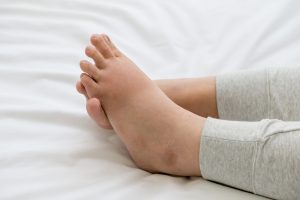 If you’ve been on your feet all day in the summer heat, you know what’s coming: uncomfortably swollen ankles.
If you’ve been on your feet all day in the summer heat, you know what’s coming: uncomfortably swollen ankles.
It can really ruin a great day. Say you’ve been out hiking and enjoying the weather with family and friends. Then you know you’ll be struggling through your dinner party with feet and ankles that are going to bust out of your shoes.
Advertisement
Even if you elect sandals, it’s still no walk in the park.
So, why do your ankles swell in the summer? There are several reasons. One of them is called veinous insufficiency, a condition that becomes more common with age.
Venous insufficiency is essentially the inability of your veins to push blood back up your legs. They have a harder time fighting gravity to carry blood back to your heart, and it can pool in your lower legs, ankles, and feet.
Other contributing factors to edema – lower leg and foot swelling caused by abnormal fluid buildup – include eating too much salt, inactivity, heat, too much alcohol, or spending a lot of time on your feet.
Age, weight, and certain medications can also contribute.
There are some at-home strategies to help you deal with edema and venous insufficiency. Here are some strategies you can try to help you relieve the pain and frustration of swollen feet and ankles.
Support Stockings: Support stockings might be one of the best treatments for venous insufficiency. They are essentially tight socks that put pressure on the veins to help move blood back up to your heart.
Advertisement
Put Your Feet Up: When you get in from your outing, spend a few minutes sitting or laying down with your feet up. Just a few minutes can get the blood flowing back to the heart to help get rid of swelling so you can carry on with the rest of your day. Sleeping with your feet elevated on a pillow may also help.
Cut Down on Salt Intake: Sodium contributes to water retention, so watching out for excess sodium intake (and too little potassium intake) can lead to swelling. Limit processed food intake and read food labels to make things a little easier on yourself.
Keep Moving: Activity also helps keep veins healthy and blood moving. Of course, exercise may not always make things easy in people with venous insufficiency, but that doesn’t mean it isn’t infinitely beneficial.
